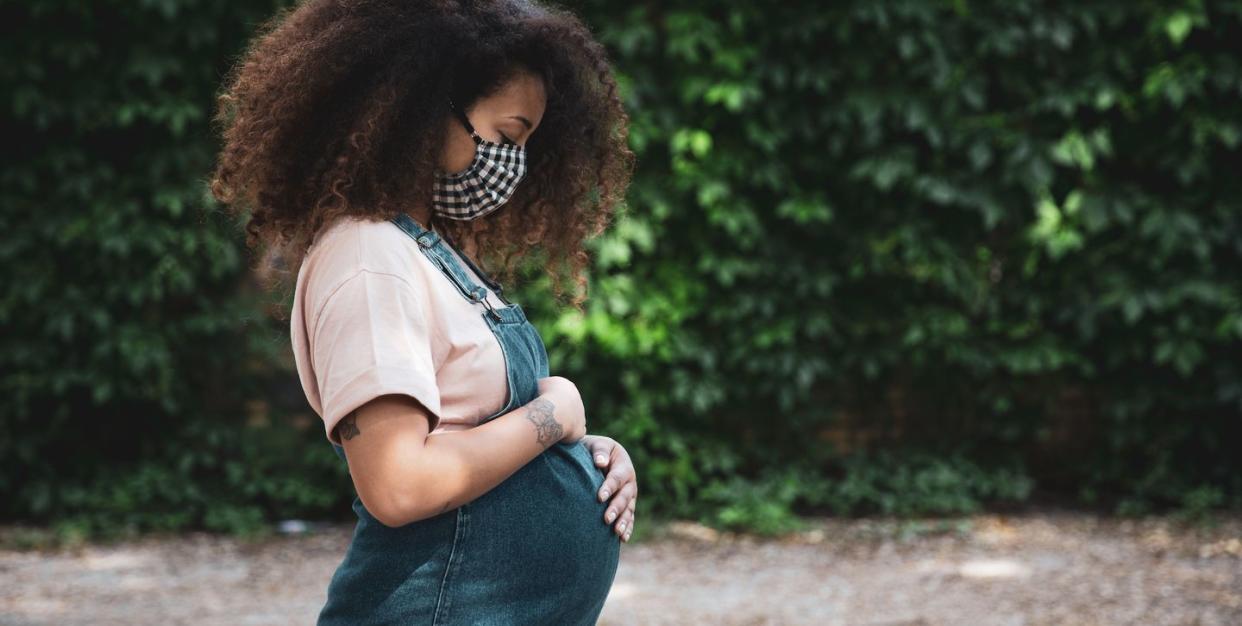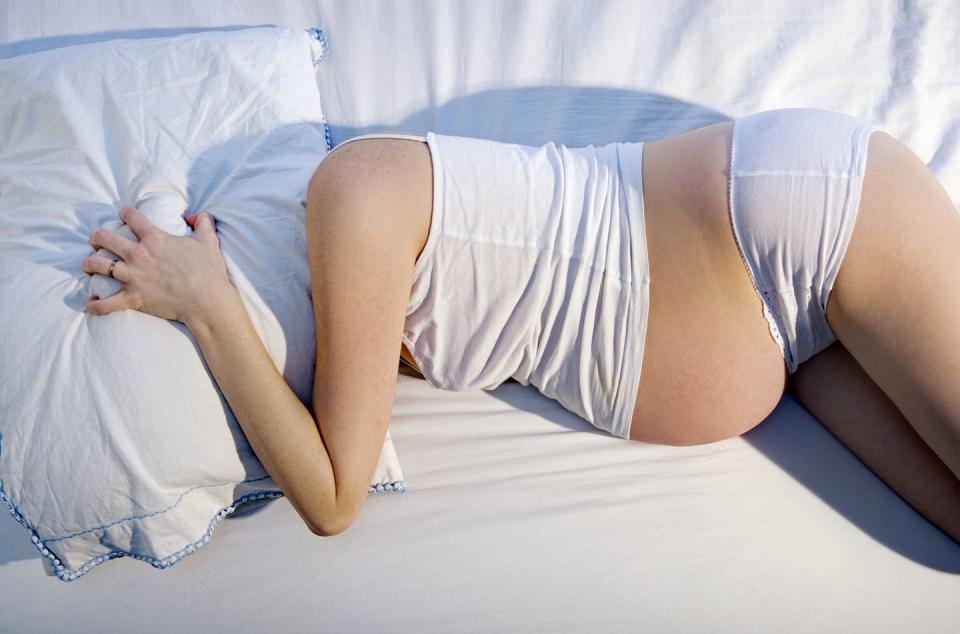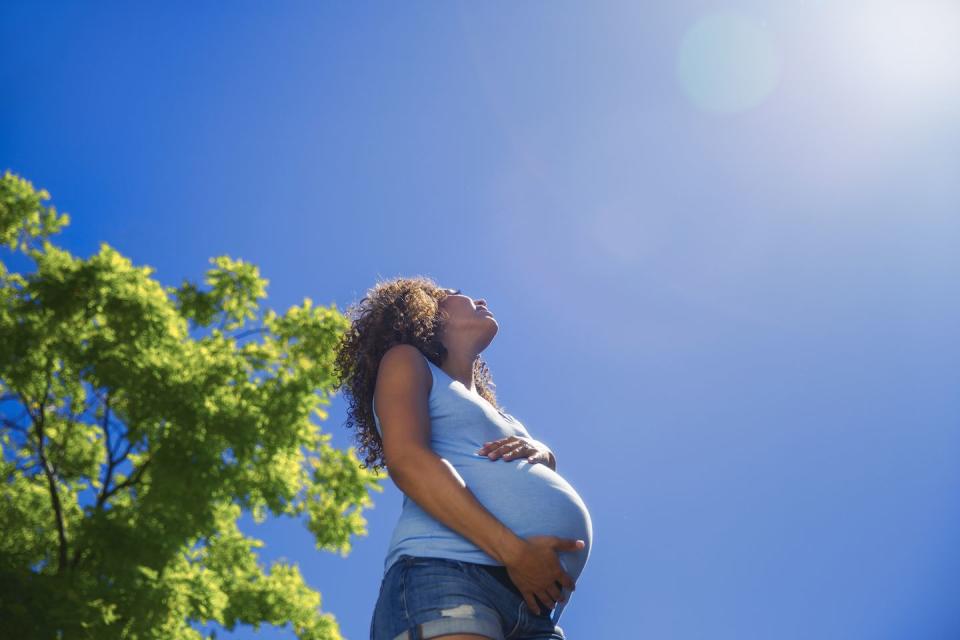Birthing Alone: Why Pregnant Women Are At Risk Of A Mental Health Pandemic

It was a queue of hundreds outside her local Primark that prompted mother-of-three Holly Avis to start the petition.
Seven months into her third pregnancy she was sat scrolling through social media in the middle of June, just as Covid restrictions had started lifting. Her scroll came to an abrupt halt when she saw a photo of Primark reopening with a snaking queue of hundreds of people waiting to go in.
‘It suddenly dawned on me, I could still go shopping with my husband and our children with zero PPE, but that same partner I live with wasn’t allowed in for appointments or all of the birth of his child, even if Covid-tested negative, wearing PPE,’ she tells ELLE. ‘I immediately felt a huge injustice and sadness and knew something had to be done.’
She started a change.org petition to call for ‘your chosen birth partner to be with you from the very start of labour to the very moment you are allowed to go home and also for scans and appointments.’
It wasn’t long before a doula from the BirthBliss Academy, an organisation that provides antenatal programmes and doula training, came across the petition and asked to join forces. That’s how the #ButNotMaternity campaign was born, ‘From there it rocketed to another 100K in a matter of days,’ says Holly of the campaign going viral.
#ButNotMaternity aims to highlight and take action around the Covid restrictions which mean that partners are unable to attend scans and maternity appointments. When it comes to the actual birth, in many hospitals birth partners are only allowed to join at the moment of established labour, which means that women could spend hours on ante-natal wards without support from their chosen partner.
This definitely needs more attention. #ButNotMaternity pic.twitter.com/1NyiO8S1yQ
— B (@TweetsByBilal) September 5, 2020
The restrictions, which vary throughout NHS Trusts and have created a kind of postcode lottery, are in stark contrast to the opening up of other parts of society. As the campaign states, you can go to the pub, but your partner cannot come to antenatal appointments or scans.
It’s a topic that has hit a nerve, as new mothers and pregnant women have shared traumatic stories in recent weeks after hearing about the campaign.
‘The saddest story I received was a lady who lost her baby, she found out alone, during her scan, that her baby had died,’ says Holly. ‘She then had to go into hospital to be induced and birth the baby which ended up being a 3-day process (which isn’t unheard of for an induction) and her partner was not allowed to be there. So she birthed alone, but of course then had to leave hospital without her baby. While I completely understand that we need to stay safe in this pandemic, at what point do we start denying basic human rights?’
This needs to be addressed immediately by the government.
I gave birth by myself & my husband didn’t see our baby until she was 3 days old. Giving birth alone was the most traumatic experience of my life. We must do better by those giving birth during this time #ButNotMaternity pic.twitter.com/h1W5lg7Ehy— Tobi Oredein (@IamTobiOredein) September 5, 2020
‘We have heard from women who are attending scans in the same room where they last discovered they were miscarrying, women who are pregnant with twins where one of the twins has tragically died, but they are still being forced to attend all monitoring appointments on their own, women who have previously had an incredibly difficult and traumatic labour are now being told they must go through the early stages of labour alone,’ says Joeli Brealey, CEO and Founder of Pregnant Then Screwed, a charity that protects the rights of mothers.

Sarah from Cheltenham got in touch with the charity with her story: ‘On the day the pubs had reopened I went to a scan alone and found out I’d had a missed miscarriage. I had to call my husband to tell him the baby we had tried for for 18 months was gone after 11 weeks. Then I had to go to all the appointments at the clinic to discuss options by myself. I was offered a medical miscarriage…but I ended up going into labour at home naturally a week later and had to grieve for my baby while people were posting pictures of their fun post-lockdown outings. It’s really added to the trauma for me. I have hardly been out because I can’t stand what’s allowed when I was forced to go through such an awful experience alone.’
The impact this has had on women has, in many cases, been severe. ‘Forcing pregnant women to attend these appointments and endure early labour on their own is having a monstrous impact on their anxiety and stress levels,’ argues Joeli Brealey.
‘Research has shown that stress is incredibly damaging for an unborn baby’s development, and there is a link between stress in pregnancy and severe postnatal depression. We are creating a future epidemic of poor mental health among mothers by not lifting these restrictions.’
For The Modern Midwife and recent new first-time mother, Marie Louise, who runs pre- and post-natal courses (enter code ELLE15 for a 15% discount of all courses), it’s important to have a birth partner present throughout labour for several reasons.
A post shared by Midwife Marie Louise (@the_modern_midwife) on Sep 6, 2020 at 10:14am PDT
‘Research has shown a reduction in the need for pain relief, reduction in c-section, shorter labours, less need for medical intervention and more positive experience of birth. Overall outcomes for women and babies improved in the presence of continuous support in labour.’
What's more, giving birth in the middle of a pandemic has only added to levels of anxiety for women: ‘Having a baby is one of the biggest life events and one in which women feel particularly vulnerable, perhaps even fearful. Birth is not just a physical experience that requires clinical support. It’s an emotional experience which is another reason birthing partners matter. Compassionate and continuous support makes the enormity of birth more manageable and this can have long term implications for women and their families.’

NHS guidelines clearly state the importance of a birth partner: ‘Having a birth partner is important for your safety and wellbeing during labour and birth.’
And yet since the launch of #ButNotMaternity in early September, NHS England has been slow to update restrictions.
It’s only been in recent days, and largely thanks to pressure from The Royal College of Midwives and The Royal College of Obstetricians and Gynaecologists which have called a delay in updating guidelines ‘unacceptable’, that changes seem to be happening.
A framework has now been introduced in partnership with NHS England and NHS Improvement ‘to support maternity services with the local reintroduction of hospital visitors and individuals accompanying women to appointments.’
There are, however, certain Trusts that have been leading the way in updating their visiting policies for maternity care and offering more hope of positive changes to come.
Shahida Trayling, Associate Director of Midwifery and Nursing at London's Whittington Health Trust, says that ‘having a birth partner should be every woman’s right.’
She has worked to ensure that there has been some form of visiting in the maternity service offered at the Whittington in north London. ‘Pregnancy even prior to the pandemic is a time of uncertainty,’ she says. ‘We wanted to continue to provide a service that not only catered to women’s physical needs but also took into account psychological impact.’

The Whittington Trust was one of the first in London to introduce overnight visiting on its post-natal ward, which remained the case throughout the pandemic and meant that partners didn’t have to leave straight after the birth. They have also recently announced that two birth partners, rather than just one, will be able to accompany mothers, as well as one visitor allowed at the 20-week scan.
While the Whittington Trust appears to be one of the most open to lifting certain restrictions, it could still be a while until there is consistency across all NHS Trusts.
It’s for this reason that the next stage of the #ButNotMaternity campaign is providing women with template letters so they can write to their own Trusts to push for more change.
After all, no woman should have to experience the myriad emotions that come with pregnancy and childbirth without the trusted support of someone they know and love.
Like this article? Sign up to our newsletter to get more articles like this delivered straight to your inbox.
In need of more inspiration, thoughtful journalism and at-home beauty tips? Subscribe to ELLE's print magazine today! SUBSCRIBE HERE
You Might Also Like


